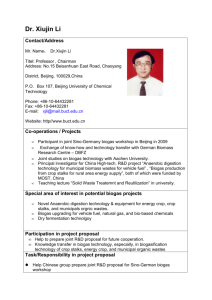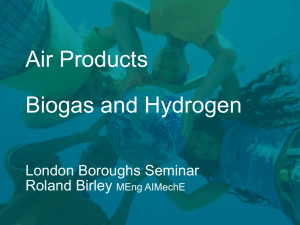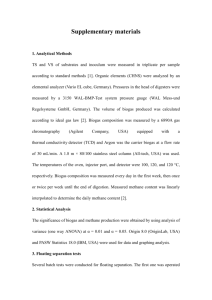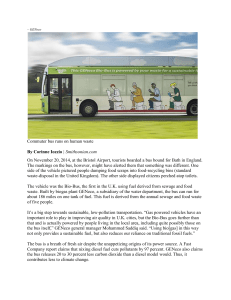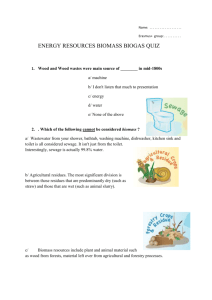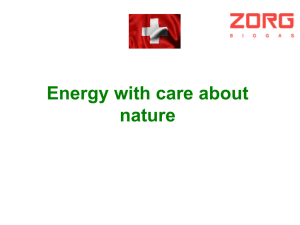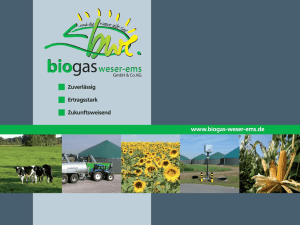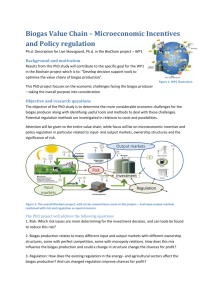Final Project Presentation
advertisement
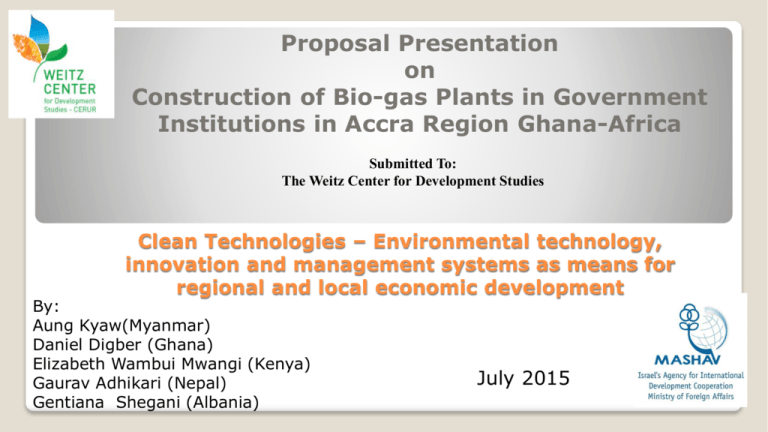
Proposal Presentation on Construction of Bio-gas Plants in Government Institutions in Accra Region Ghana-Africa Submitted To: The Weitz Center for Development Studies Clean Technologies – Environmental technology, innovation and management systems as means for regional and local economic development By: Aung Kyaw(Myanmar) Daniel Digber (Ghana) Elizabeth Wambui Mwangi (Kenya) Gaurav Adhikari (Nepal) Gentiana Shegani (Albania) July 2015 Overview of the project The scope: Turning sewer and organic waste to bio-gas for cooking in selected government schools and hospitals. Cooking with LPG Cooking with fuel wood Cooking with biogas Vision To develop green energy from waste for a cleaner environment and sustainable development To provide clean fuel by converting waste to energy for government institutions at an affordable cost and better environmental protection in the Greater Accra region in Ghana by year 2017. Background Information Accra • Project will be implemented in Ghana, Accra region. • Population of 24,900,000 and 2,400,000 in Accra region • GDP growth rate: 4% (2014) • Human development index is 0.53 and a life expectancy rate of 61.13 years (UNDP, Human Development Report, 2014). • High annual growth rate of 2.4% compared to 1.6% for other lower-middle income countries. Energy Situation • Installed capacity for power 2846.5 MW (hydro and thermal) • Power gap 10% nationally and larger in Accra region due to high population and industrial use) Challenges in power production • Falling water levels • economic development • population increase and • cost of fuel for thermal generation. Government has been subsidising the institutions, Government directive has resulted to increase in cost in the use of wood fuel and LPG gas Strategies Objectives Implement green technologies in 5 public and treatment of waste water and sludge for hospitals and 5 public schools in Accra and gardening and upscale the project to 5 public reduce the use of wood fuel and LPG cost by 50% schools and 5 public institutions in Accra Ghana by 2017. Increase demand of biogas to 40% of institutions by 2017. Promote clean technology in educational institutions and hospitals by improving Educate the institutions and communities on use of bio-gas from waste water against the culture in Accra city by 2017. Pilot production of bio-gas from organic waste and traditions. Influence policies and procedures on waste water and bio-gas through training and awareness compliance to environmental regulation creation and collaboration with government and guidelines by 20%. other stakeholders. Improve the quality of human life in government institutions by reducing the amount of money spent in the hospital and man hours lost due to health complications. Creating awareness on waste disposal and re-use of waste in development of bio-gas and use of the by product. SWOT ANALYSIS Strength Weakness 1. Constant supply of feed stock waste (septic sanitation) 1. Low internal capacity: (Need training) 2. Enough land for the project 2. Low Institutions budget for investing in the 3. Predictable raw material 4. Reduction of cost for fuel 5. Savings on wood fuel and water re-use for gardening 6. Low cost supply of fuel 7. No transport cost (On-site production) 8. Innovation on waste management 9. Compliance to National Protection Agency (Reduce litigations and improper waste disposal) 10. One time investment 11. Low competition (no innovations on alternative energy) 12. Low maintenance cost 13. Involvement of stakeholders and Information sharing (National, local and development partners) 14. Change community perspective of waste and waste management 15. Provide opportunity for collaboration with government, financial institutions and other stakeholders 16. Environment protection/prevent deforestation project 3. The institutions adoption (New products going against cultural norms 4. Institutions bureaucracies in start-up project (Internal procedure may cause delays) 5. Inadequate data on amount of waste produced. 6. No proper or clear communication among all project stakeholders. Opportunity Threats 1. Introduction of new technologies services and ideas in waste management and energy sector (New innovation) 2. Clean environment 3. It creates demand for alternative sanitation and energy projects 4. Improving the local economy (Employment of the youth in the community) 5. Already an existing global clean technology initiatives (Can attract support both resources and technology) 6. Existing market for renewable energies 7. New products for the institution (Sludge for fertilizer or compost, water re-use in farming, farm output and research knowledge) 8. Market leader in water & sanitation innovation in sanitation 9. Appropriate climatic conditions for production and up scaling in the country. 10.Reduce global warming & carbon foot print 11.Acceptability of new innovations to clean environment, energy sources and costs 12.Existence of renewable energy policy 13.Existing trainable human resource capacity in the institutions. 1. Traditions and culture 2. Bureaucracies in approvals 3. Biogas contains some gases as impurities, which are corrosive to the metal parts of internal combustion engines. 4. No existing policies procedure and regulations on biogas production. 5. Lack of approved standardised bio-digester designs for public acceptance Logical framework Project Summary Goal To convert waste to Indicators organic 5 public hospitals and 5 Certificates bio-gas in public schools schools and hospitals in biogas from Assumption of Available using commissioning and funding Greater Accra Region in sources in Greater Accra support and partners Region by 2017 To replace the use of Reduction of the use of 50% reduction L.P.G and use of wood wood fuel and LPG cost expenditure fuel in five schools and by 50% in 5 Accra Region in Ghana schools in Greater Accra Region by 2017 on public gas and wood fuel five hospitals in Greater hospitals and 5 public by 2017 government institutional organic Ghana Purpose Means of Verification of Willingness of the L.P.G beneficiary institution to accept the project Output Activities Developed policies on bio-gas. Trained manpower on bio-gas operation and maintenance. Bio-gas plant constructed. A demonstration/ training for the school children in beneficiary school. Desktop study and key stakeholder engagement e.g. government, development partners Create awareness to public on bio-gas. Train personnel for operation and maintenance of the biogas (Trainee provided by the institution) Tender for a contractor for the bio-gas plant construction. Select and sign the contract Monitoring and evaluation of contractors work. Developed policies on bio-gas by 2017 2 personnel trained on bio-gas per institution by 2017 10 biogas constructed in 5 public hospitals and 5 public schools by 2017 Children trained in beneficiary schools 5 meetings held with key stakeholder Brochures, fliers printed and distributed Training material, Attendance list Tender document prepared and contracts signed Meetings held with contractor Policy documents on bio- gas. Competence of the trained personnel. 10 existing bio-gas plant. Training curriculum for the school children Desktop study report. Minutes of the meetings. Expenditure documents for awareness program and training materials. Signed contract for the construction of the project Field and project status reports. Bio-gas policies are not conflicting with other existing policies Institution willingness to provide personnel for training Availability of land for construction and financing of project. Willingness for the beneficiary schools to allow training Willingness of the stakeholders to cooperate No stigmatisation of the project by the community. Personnel provided by institution have the requisite qualification for training. Contractor meets the appropriate criteria for corporation and deadlines as set in the contract. BUDGET FOR THE CONSTRUCTION OF BIOGAS FOR PUBLIC SCHOOLS AND HOSPITALS Description Unit Price ($) Total Number Total Cost ($) Human resource Project Manager 800 24 19200 Administrative Officer 500 24 12000 Total 31200 Direct Project Cost Administrative Cost 200 24 4800 Vehicle rental & fuel cost 200 50 10000 Desktop study, survey and data collection 5000 1 5000 Training for selected artisans from beneficiaries 5000 1 5000 Design and Costruction biogas plant with its accessories 12400 10 124000 Stakeholder engagement and policy development 5000 1 5000 Total 153800 Grand Total 185000 ACTION PLAN Action Responsibl e Person Completion Date Required Resources Potential Barriers Collaborators Economic Project Team 3 months analysis, Field assessment and data collection Logistics, funds Existing data gaps Awareness Project Team 3 workshops creation and during the public education project period Logistics, funding Stakeholders who will provide information Government Ministries & Departments Lack of cooperation (Ministry of Education, Ministry of Health, form data providers Ministry of Energy, Environmental Protection Agency, Ministry of Works , Water Resources and Housing) Lack of support and Government Ministries, Civil Society interest from all Organisations, Beneficiary Schools and stakeholders Hospitals, community Budget Community perceptions, culture and traditions. Research, design and construction Project team, external consultants 2 years Logistics, land, funding, construction materials Lack of corporation Beneficiary Schools & Hospitals from beneficiary Contractors institutions Funding agencies Budget Localizing the national and municipal policies for biogas regulation. Project team, external consultants 2 workshops to be organised during the implementation of the project Logistics, Lack of corporation Relevant Government Ministries & conference venue, from relevant Departments, Civil Society Organisations, available public institutions Beneficiary institutions data/information WORKPLAN FOR CONSTRUCTION OF BIOGAS PLANT IN SELECTED PUBLIC SCHOOLS AND HOSPITALS Activities Months 1 2 3 4 5 6 7 8 9 10 11 12 13 14 15 16 17 18 19 20 21 22 23 24 Desktop study, suirvey and data collection Awareness creation Development & preparation of training materials Recruit artisans Training for selected artisans Request for bids/tender for design and construction of biogas plants Select and award contract for the construction of biogas plants Engage stakeholders on biogas policy & regulations Commence construction of biogas plant Commissioning of biogas plant Policy document preparation Stakeholder validation workshop Evaluation and stakeholder validation workshop Report preparation and handover Project Hazards Challenges Inability to meet deadlines due to lack of resource and funding. Poor coordination can lead to challenges in the project. Information availability from collaborators or lack thereof can slow the project down. Design and construction of biodigesters not meeting quality specifications may pose as a challenge to the project. No proper or clear communication among all project stakeholders. Low level of transparency in the project. Lack of legal regulation for the implementation of biogas. Threats of corruption to the project. • Bureaucracies in approvals of projects. • Corrupted government officers. • Overlapping of governmental intuitions. • Lack of transparencies in contract. • Loop holes in contract between organizations and contractors. • Bad management of funding. • External interference in project. • Hiding information/Disinformation • Collusion and coercive by the government officers Solutions Tools used to tackles corruption • Develop engagement procedures. • Stake holder agreements. • Comprehensive engagement procedures. • Proper financials keeping. • Strict adherence to statutory and regulations and requirement • Use of proper materials and equipment Planning for these issues Risk assessment and mitigation for each pillar or issue Commit resources for each mitigation Follow procedures strictly Proper planning for the project Monitoring and evaluation. Setting deadlines Setting achievable output matched with resources External audit to audit accounts of the project Project Impact Social and economic benefits eliminates the direct handling of faecal matter Direct savings are made on the cost of fuelwood or LPG for cooking. Eco-entrepreneurship is promoted through job creation Promotes societies acceptability of the biogas system as the best way in managing waste. Health Minimise the direct contact/handling of faecal matter which is a potential health hazard. Reduce bad odour (biogas) from the environment which can be a public nuisance. Reduce the risk of water-borne diseases transmitted through human excreta from spreading. Reduce the use of wood fuel and charcoal which produces sooths and smoke which when inhaled can pose health hazards to caterers and users Policy It helps government to identify and implement policy initiatives in the promotion of waste management and renewable energy. Identify market based instruments for service providers to make the design and construction of biogas systems affordable. Potential Sources of Budget • Development partners and government of Ghana Future of the project Sustainability • The project is aimed at introducing renewable energy in the energy mix in Government institutions. • The conversion of waste to energy ensures sustainable use of the waste produced. • There is the conservation of forest through the minimisation of the use of fuelwood. • Reduction of carbon footprint of the schools and hospitals. • The on-site treatment of the faecal matter promotes sustainable waste management. Biogas plant Toda Our Dream: A future with clean energy and green environment......
